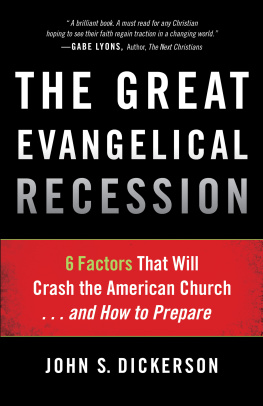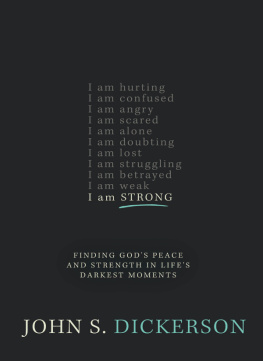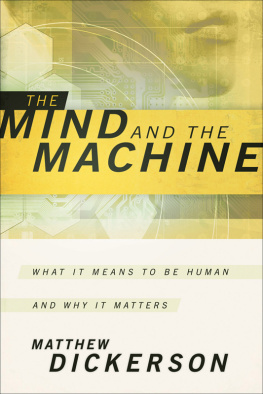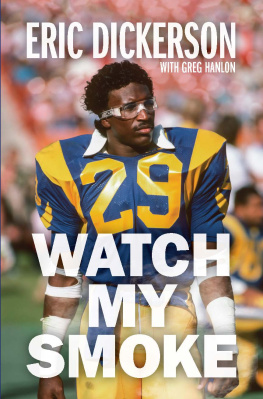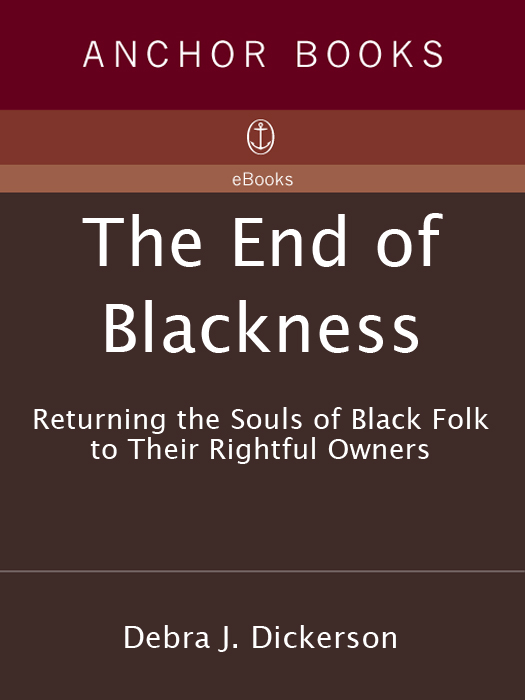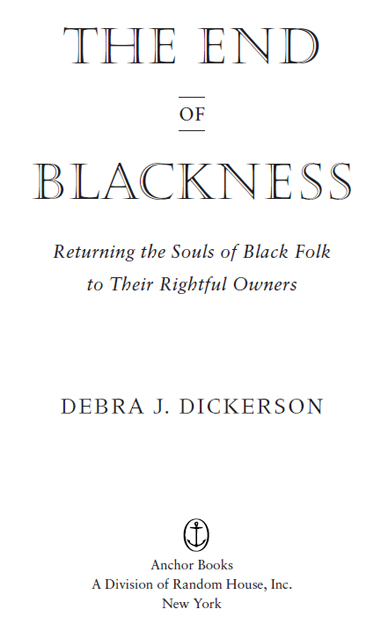Acclaim for Debra J. Dickersons
THE END OF BLACKNESS
Stimulating. Provocative. Loaded with wish-Id-said-that one-liners. Dickerson has a way with words and a timely message. When she says its time for black America to get off its duff, shes not asking anyone to do something she wouldnt doand hasnt doneherself.
Chicago Tribune
Blunt and bracing. The End of Blackness is a solidly researched account of the evolution of black identity in America (her prologue is about as concise and direct an account of slavery and its long-standing effects as you are likely to find). Dickersons is a message for all Americans, not only those who are confused about how to think about race.
Mother Jones
Fascinating. A call to arms. Dickerson knows how to throw a literary punch.
Pittsburgh Post-Gazette
[Dickerson is] a thinker who suffers no fools of either the liberal or the conservative stripe. Revive[s] a tradition of clear-eyed, accessible writing about black political destiny in the vein of W.E.B. Du Bois, Carter G. Woodson, and Frederick Douglass.
The Atlantic Monthly
A brave, original, and angry book. I find much to agree with. We Americans need to get out of the race routine, and black folk must lead the way. The end of blackness is worth striving for.
Glenn C. Loury, The Boston Herald
Compelling. Exhibits a praiseworthy independence of mind, questioning everyone from the Black Politborothe civil rights establishment, which sets the tone of black politicsto white apologists who still downplay the ravages of slavery. A stirring endorsement of a new marriage of responsible civic individualism and dedication to the collective good.
The Washington Post
[An] important and powerful book. With deft, precise and often humorous language, Dickerson takes equal aims at both whites and blacks who would deny the diversity of opinion among blacks and dictate how they should think.
San Antonio Express-News
Illuminating. Throw[s] the entire damn dictionary of race out the window. Dickerson journeys into interesting, and gutsy, terrain.
The Washington Monthly
Dickerson has a great deal to offer about the perplexing constraints of race, and in this exhaustive collection of essays on the subject she doesnt merely say it: She rants, raves, vents, exposes, attacks, questions, ponders, pontificates and theorizes. Shes dead on.
Fort Worth Star-Telegram
[Dickerson] is emerging as one of this countrys leading authors on race. The End of Blackness explains how racism laid and continues to maintain the groundwork that makes escape so difficult.
The News & Observer (Raleigh)
Incendiary. [Dickerson throws] a heavy and sharp-knuckled gauntlet.
Newsday
Dickerson is courageous, smart and well-informed. She has a wonderfully sharp sense of humor. [The End of Blackness] serves as a fitting tribute to the achievement of Dickersons heroes, among them Frederick Douglass, Ralph Ellison and especially Carter G. Woodson.
The Washington Times
Bold and appropriately documented. Dickerson writes with sincere concern for the plight of African-Americans. The End of Blackness is not an attack. It is a plea for blacks to look inward.
St. Petersburg Times
DEBRA J. DICKERSON
THE END OF BLACKNESS
Debra J. Dickerson was educated at the University of Maryland, St. Marys University, and Harvard Law School. She has been both a senior editor and a contributing editor at U.S. News & World Report, and her work has also appeared in The New York Times Magazine, The Washington Post, The New Republic, Slate, The Village Voice, and Essence. She lives in Albany, New York.
FIRST ANCHOR BOOKS EDITION, JANUARY 2005
Copyright 2004 by Debra Dickerson
All rights reserved under International and Pan-American Copyright
Conventions. Published in the United States by Anchor Books, a division of
Random House, Inc., New York, and simultaneously in Canada by Random
House of Canada Limited, Toronto. Originally published in hardcover
in the United States by Pantheon Books, a division of Random House, Inc.,
New York, in 2004.
Anchor Books and colophon are registered trademarks of Random House, Inc.
Due to limitations of space, permissions to reprint previously published
material can be found following the index.
The Library of Congress has cataloged the Pantheon edition as follows:
Dickerson, Debra J., 1959
The end of Blackness : returning the souls of Black folk to their rightful owners / Debra J. Dickerson.
p. cm.
Includes bibliographical references.
1. African AmericansRace identity.
2. African AmericansSocial conditions1975
3. Self-relianceUnited States. 4. African AmericansPsychology.
5. Race awarenessUnited States. 6. United StatesRace relations. I. Title.
E185.625.D53 2004 305.896073dc21 2003056346
eISBN: 978-0-307-48428-4
www.anchorbooks.com
v3.1_r1
To James Baldwin, Amiri Baraka, W.E.B. DuBois, Ralph Ellison, E. Franklin Frazier, Dr. Martin Luther King Jr., Albert Murray, Thomas Sowell, Malcolm X, and especially Frederick Douglass and Carter G. Woodson. Finally, worthy leaders and thinkers. Now I know how to be both black and human. Now I know how to think because now, having sought out the unBlack History Month, Chicken McNuggetized, contextless quote, I know how thoroughly Ive been bamboozled as to my true intellectual and moral heritage and I know who did the bamboozling. Now I know that its black people they strove to challenge and perfect, not the rest of the world. They loved us more than they hated anyone else. Thats a gift beyond measure for an orphan race.
CONTENTS
PROLOGUE:
Blackness Before the Dawn
One
TAKING THE WORDS OUT OF BLACK MOUTHS:
Narcissism, Know-Nothingness, and White Intransigence
Two
KENTE CLOTH POLITICS:
The White Mans Ice, Know-Nothingness, and Black Futility
Three
GONE NATIVE:
The Uncle Tom Imperative
INTRODUCTION
This book will both prove and promote the idea that the concept of blackness, as it has come to be understood, is rapidly losing its ability to describe, let alone predict or manipulate, the political and social behavior of African Americans. Given its strictures and the limitations it places upon the growth and free will of those to whom it refers, it diminishes their sovereignty as rational and moral actors. Nearly 150 years after the end of slavery, a generation past the end of Jim Crow, the time is overdue for blacks to reforge their identity to reflect the progress already made and to prepare for that still to come. Blackness must be updated so that blacks can free themselves from the past and lead America into the future.
Race-obsessed for centuries, America has sacrificed forests to create books proving that blacksmeasure of oppression overcome the moment an individual loses the power to represent anyone but herself, when a neglectful welfare moms actions taint no one but her?
As convulsed as America has been over race, little of the discussion has focused on charting societal progress at the individual level. But how does any one individual make real in her own life the sacrifices of blood, sweat, and tears that made the progress possible?



